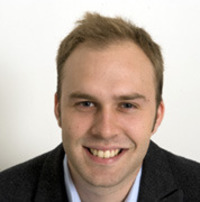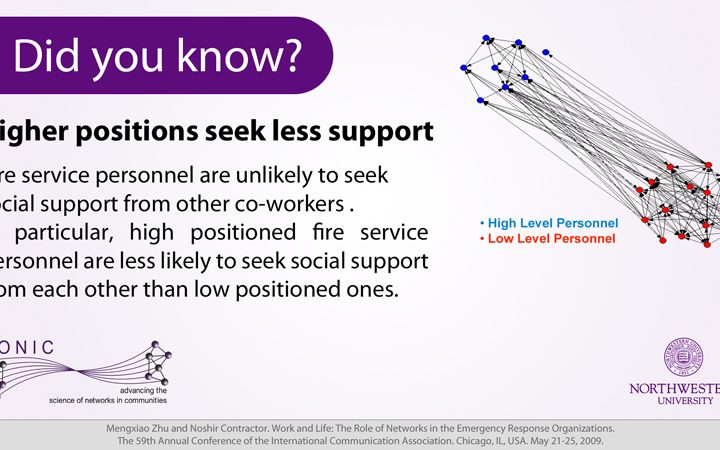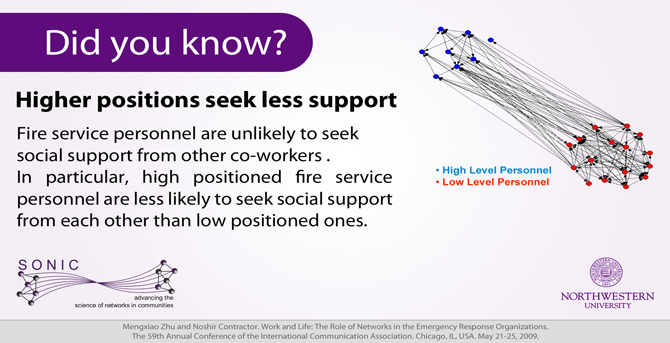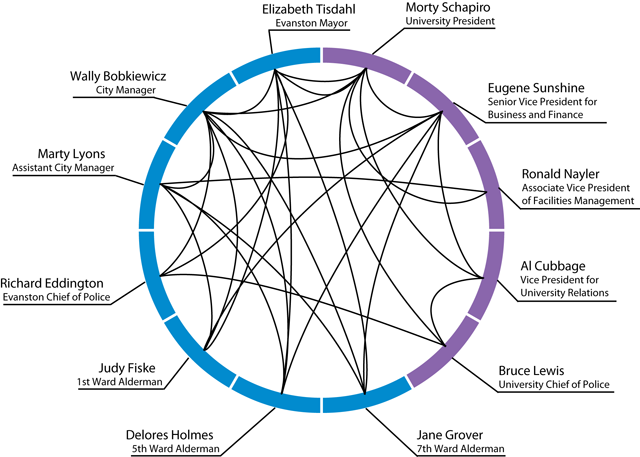Town-gown social network graph makes front page of Daily Northwestern
In Focus: Northwestern-Evanston ties thrive most at the top
Article by Marshall Cohen, graphic by Chelsea Corbin, Daily Northwestern
Tuesday, February 28, 2012
Tim Hannigan to present in the SONIC speaker series
 Tim Hannigan will be presenting a SONIC speaker series talk at 2:30pm on February 27th in room 1-421 of the Frances Searle Building. Tim is a Doctoral Candidate at the Saïd Business School, University of Oxford.
Tim Hannigan will be presenting a SONIC speaker series talk at 2:30pm on February 27th in room 1-421 of the Frances Searle Building. Tim is a Doctoral Candidate at the Saïd Business School, University of Oxford.
In his upcoming talk, Tim will focus on his research on the evolution of product ontologies. As
cognitive representations packaging up product attributes, use-cases and buyer
characteristics, these knowledge structures become embedded as market categories.
This talk will show that the fuzzy-front end of a product market is marked by ambiguity
and uncertainty around definitions and concepts that appear in the form of rumour.
Using a computer-aided text analysis on discourse of “tech-bloggers”, Tim will show that
this uncertain knowledge is refracted by social media into semantic networks that
demonstrate the emergence of meaning structures.
[line]
How Product Ontologies Evolve: Evidence From Recent History of the Tablet Computer
Contractor lectures at Indian Institute of Tech. and Tata
SONIC Lab director Noshir Contractor delivered lectures on Networks and Team Assembly at the Indian Institute of Technology, Bombay http://www.iitb.ac.in/ and at the Platinum Jubilee (75th Anniversary) celebration of the Tata Institute of Social Sciences in Mumbai http://platinum.tiss.edu/
Contractor Served on Organizational Science Conference Panel
SONIC Lab Director Noshir Contractor participated on a panel titled “Big Data: Challenges and Opportunities” at this year’s Organizational Science Winter Conference in Steamboats Springs, CO on Formal Organizations Meet Social Networking. http://www.informs.org/Pubs/
Calls of NetSci2012 in Evanston, IL
Call for Contributed Talks & Poster Abstracts
Bringing together leading researchers, practitioners, and teachers in network science (including analysts, modeling experts, visualization specialists, and others), NetSci fosters interdisciplinary communication and collaboration. The conference focuses on novel directions in networks research within the biological and environmental sciences, computer and information sciences, social sciences, finance and business.
Deadlines
February 29, 2012: Submission of Abstracts
April 15, 2012: Notification of Acceptance
June 1, 2012: Last Day for Submission of Revisions
Rules Governing Submission of Contributed Talks & Posters
1. A first author may present only one contributed abstract for the regular program. If a second abstract is submitted with the same first author, that abstract may be placed as a poster, at the discretion of the program committee.
2. Abstracts submitted after the abstract deadline may be placed in poster sessions or rejected at the discretion of the program organizers, who are under no obligation to schedule any contributed abstract that arrives after the close of business on the deadline date.
3. Preferences expressed by the author for oral or poster presentation, for presentation on a particular day, or for a particular order of presentation within a session, will be accommodated whenever possible, but at the discretion of the program organizers. Please note your preference at the end of your abstract: Contributed Only, Poster Only or Both.
4. Abstracts must be submitted via the EasyChair abstract submission link. Although .pdf submissions are accepted, you still MUST add the author’s and abstract in the spaces provided. For .pdf’s, font must be no less than 10pt, have 1 inch margins, single space formatting and cannot exceed 1 page.
Submission Link: http://www.easychair.org/conferences/?conf=netsci2012
5. Once the abstracts have been sorted by the program organizers, honoring requests for changes to abstracts will be limited to misspellings in authors’ names up until the program is published on the web. Therefore it is imperative that you proof your abstract prior to submission.
6. Upon notification of abstract placement in the program it is the responsibility of the authors to check the abstract on the web program immediately and notify the NetSci staff of any discrepancies.
7. Requests for withdrawals must come to the NetSci in writing by e-mail. Withdrawals received prior to the printing of the program Bulletin will be withdrawn from the Bulletin. Withdrawals received after the printing of the Bulletin, will be reflected in the program Corrigenda.
8. In general, the time allotted for the presentation of oral contributed abstracts is seventeen minutes for presentation and three minutes for questions.
9. Authors of abstracts assigned to poster sessions should be sure that the title and content of the poster correspond to the title and content of the abstract printed in the program Bulletin. The poster should be displayed so that a number of people can view the presentation at the same time. You may tack your poster up to the provided backing boards. When designing your poster, take into consideration that attendees may be viewing the material from a distance beyond 3′. The minimum poster size is 3′ high x 3.5′ wide (.92 x 1.07 meters) but no larger than 4′ high x 4′ wide (1.22 x 1.22 meters).
All questions regarding NetSci 2012 Contributed Talks/Posters should be directed to netsci2012@gmail.com. Please place in the subject heading – “Calls”.
SONIC presented activities as part of WSTNet
On January 11th, SONIC lab presented some of its current activities as a part of the Web Science Trust network. These presentations are available online as webinars. To view the videos, follow the link: http://bit.ly/xlADAx. To download our introductory slides click here
Contractor interviewed on 3 “comms”
SONIC lab director Dr. Noshir Contractor was interviewed on 3 Comms – Commerce, Communication and Communities. MYRA School of Business, India. Watch the full video here: http://www.youtube.com/watch?v=-SySMmpgSe0
Edward Smith SONIC Speaker Series
 On Monday, February 6, from 9:30-11:00 a.m. Dr. Edward (Ned) Smith will be giving a presentation in room 1-483 of the Frances Searle Building on the Northwestern University Evanston Campus. The talk is entitled “Identity and Network Activation”.
On Monday, February 6, from 9:30-11:00 a.m. Dr. Edward (Ned) Smith will be giving a presentation in room 1-483 of the Frances Searle Building on the Northwestern University Evanston Campus. The talk is entitled “Identity and Network Activation”.
About the talk
In his talk Ned will focus on his research on Identity and Network Activation. Using a dynamic cognitive model of network activation, Ned and his colleagues experimentally test two com peting hypotheses on the link between identity and network activation. On one hand, affirming people’s power might enable agency. On the other hand, if such power affirmations conflict with people’s more stable status characteristics, this could create tension. These hypotheses were tested experimentally by priming people at varying levels of status with power
(high/low) and social change (significant/none) and asking them to recall their social networks. Results suggest that stable, confirmed identities, and not feelings of power, are the foundation from which people can exhibit greater network responsiveness.
About Ned Smith
Ned Smith is an Assistant Professor of Strategy at the Stephen M. Ross School of Business, University of Michigan. He received his Ph.D. from the University of Chicago Booth School of Business prior to joining the faculty at Ross in 2010. His research focuses on the construction and consequences of organizational identity, with an emphasis on financial markets. He draws on sociological and network theories to develop and test new identity-based models of organizational behavior and investor decision-making. He also studies how people mentally construct their social worlds -i.e., their social networks- according to situational and environmental variations. Ned’s research has been published or is forthcoming in leading journals such as the American Journal of Sociology, The Journal of Mathematical Sociology, Management Science, and Organization Science.
The flyer for the talk can be downloaded here.
Observations on cognitive diversity and team performance
“One team achieved an almost perfect score. When we looked at the composition of this team, we found it was the only one that did not consist entirely of engineering managers. In fact, it included the general manager, his administrative assistant, and one of the non-technical support staff. And when we looked at the strategy this team used to solve the problem it transpired that it was the administrative assistant who suggested the approach that allowed the team an almost perfect score.”
The business of software: The Difference Engine
Observations on cognitive diversity and team performance
Communications of the ACM
Vol. 55 No. 1, Pages 33-34
10.1145/2063176.2063191




